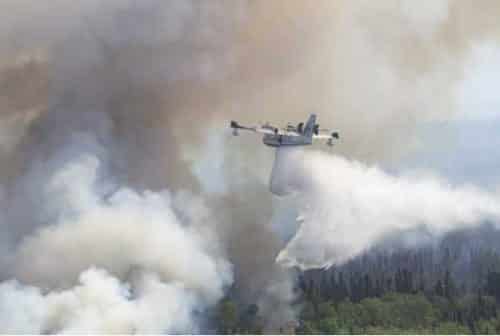JOINT BASE ELMENDORF-RICHARDSON, Alaska — Members of the Alaska National Guard assisted in the evacuation of Rainy Pass Lodge Tuesday night/Wednesday morning as a wildfire from a lightning strike two miles away spread toward the lodge where youth were attending a summer adventure camp.
The Alaska Rescue Coordination Center was made aware of the fire and notified appropriate authorities, coordinating with Rainy Pass Lodge, Alaska State Troopers, the Alaska Division of Forestry, Palmer Fire and Rescue and Clearwater Air.
An HH-60 Pave Hawk helicopter from the Air National Guard, with two pararescuemen on board, provided assistance to local authorities, evacuating 26 people and two dogs to safety in Skwentna.
Skwentna is a small community of about 50 people, about 73 air miles northwest of Anchorage, and requires travel by air or boat.
An Army National Guard CH-47 Chinook helicopter, with three Air Guard pararescuemen, transported the individuals from Skwentna to Joint Base Elmendorf-Richardson.
The Pave Hawks that responded are from the Air Guard’s 210th Rescue Squadron, which supports an alert mission around-the-clock, year-round. They were able to quickly get to the lodge once it was determined that evacuation was necessary.
[content id=”79272″]
“Our priority was to get the people to safety as rapidly as possible, so we started with women and children and loaded up the Pave Hawk, then transported them to Skwentna,” said Lt. Col. Keenan Zerkel, director of the Alaska Rescue Coordination Center. “Then we went back for the rest of the people on the second trip.”
The RCC coordinated for the Chinook to fly directly to Skwentna, where all of the evacuees were loaded into the tandem-rotor, heavy-lift helicopter, which can transport up to 44 passengers.
According to Chief Warrant Officer 4 Mark Ward, the Chinook pilot on the mission, this was the first rescue that Army Guard Chinooks have accomplished since they arrived, new to the unit this year.
“It was great to be able to help these people; it made my day,” said Ward. “I’ve been in the unit 29 years and this was a highlight.”
This was the largest number of people that the 210th RQS has ever evacuated with one Pave Hawk, according to Zerkel.
“I’m proud of this mission, the way we all worked together so quickly to get these civilians to safety,” said Zerkel. “We did it in four hours from the time we heard about the fire, which is really pretty remarkable.”
The AKRCC, 210th RQS and 1-207th AVN were awarded 26 saves for this mission. Skwentna Roadhouse Services provided fuel for the Pave Hawks to return to base and the American Red Cross also set up an overnight emergency shelter for the evacuees.







